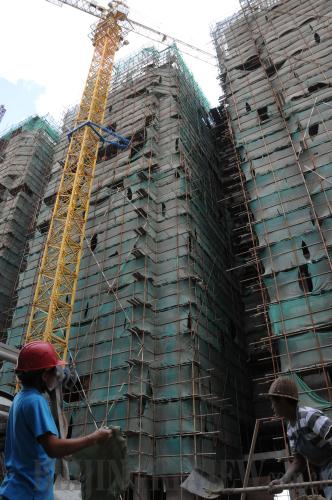|
 |
|
HOUSING FOR CONSTRUCTORS: A low-cost apartment community for migrant workers nears completion in Fuzhou, Fujian Province, in August (LAI JIANQIANG) |
Legions of urban residents now priced out of China's booming housing market may soon get relief under a new law working its way through China's legislative system.
Xinhua News Agency reported on November 8 the Ministry of Housing and Urban-Rural Development submitted a draft Basic Housing Security Law to the Standing Committee of the National People's Congress (NPC). The NPC is now soliciting opinions from other governmental units. The draft law sets standards for low-income housing construction and management; specifies applicant requirements; and deals with related issues such as rent subsidies for low-income earners; economic incentives and taxation; and housing guarantees for farmers.
The law is intended to rectify problems caused by the commercialization of China's real estate sector. Over the past 12 years, market reforms in the industry have generated jaw-dropping profits and brought huge revenues to local governments through land sales. However, astronomical prices have meant many people are unable to own their own apartments and are often reduced to living in crowded, overpriced housing.
A new term has even sprung up to describe such people "ant tribes." These people, often low-income college graduates, frequently live in tiny rooms in overstuffed apartments subdivided to fit 10 or 20 people, instead of three or four as originally intended. They should have been entitled to low-priced government housing for rent if there was sufficient supply of this kind of housing.
Twelve years ago, the government attempted to provide for low- and middle-income earners when it commercialized the housing market. However, State Council directives and local implementing regulations were not satisfactorily implemented.
An editorial published on the website of Shanghai-based Xinmin Evening News said, with the new law under consideration, China's housing system is returning in some ways to its starting point 12 years ago. Under the earlier system, housing was distributed to people at below-market prices, usually through their place of employment. Although the new law may seem in some ways like a return to the past, the editorial said it is actually a symbol of progress since market tools and social welfare policies will be combined to guarantee citizens' right to housing.
The much-anticipated new law is expected to ensure the construction of affordable and low-rent housing. In recent years, the booming real estate market created disincentives for building less profitable housing.
Gao Fengtao, Vice Director of the Legislative Affairs Office of the State Council, said in March that the law is expected to be implemented in 2011.
Affordable housing problems
While more and more people have found jobs in big cities as China's urbanization has accelerated, the amount of affordable housing has not kept up due to a lack of funds and land.
Statistics released by the NPC in October showed that the Central Government had already spent its annual budget for the construction of affordable housing, 79.2 billion yuan ($11.8 billion), by the end of August. At the same time, local governments, which should shoulder part of the cost, said they faced difficulty in raising money for housing. According to the NPC report, only 23.6 percent of the housing funds required from local authorities in 2009 had been allocated in the first eight months of that year.
Another problem is that local authorities are reluctant to spare land for low-income housing projects since they yield low profits. Tao Yan, a professor at Renmin University of China, said local governments, whose revenue relies heavily on the land sales, have no motivation to provide land for building low-income housing.
"When one plot of land is used for the construction of affordable and low-priced housing, the price for nearby plots of land immediately falls in auctions. It is impossible for governments to harm their own interests," Tao told China Business News. Tao said that the fundamental solution is to change government's position as the sole land supplier.
Shen Weixing of Tsinghua University's School of Law told China Business News that funds for building affordable housing should be mainly provided by local governments while private capital should be encouraged to participate too. Shen also said officials of local governments should be evaluated on their efforts to build low-priced housing and should be held accountable if they fail to meet their targets.
In October, the Ministry of Housing and Urban-Rural Development said it will conduct an inspection of affordable housing construction nationwide in cooperation with other government departments. Local government leaders who are in charge of affordable housing construction will be directly criticized if the projects in their cities or provinces are proceeding too slowly.
| 